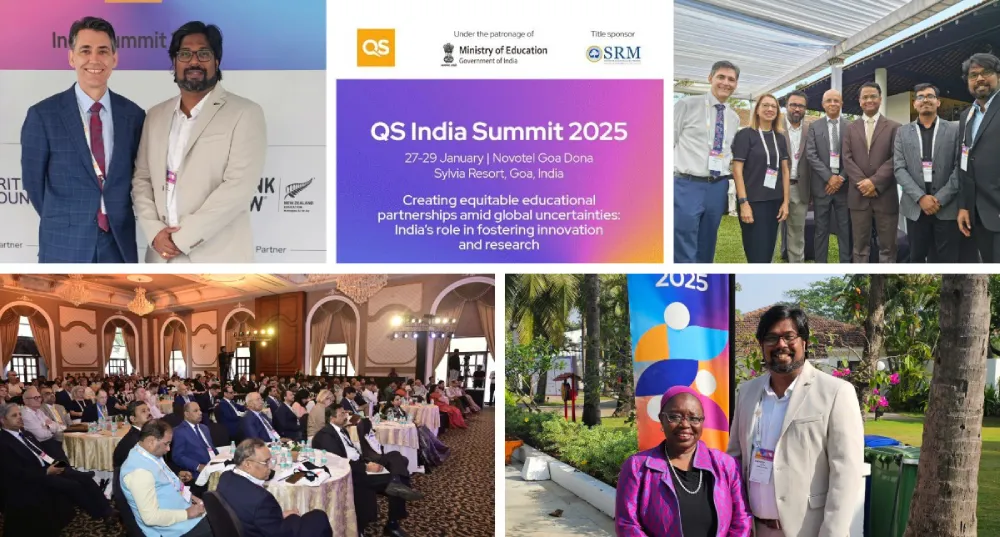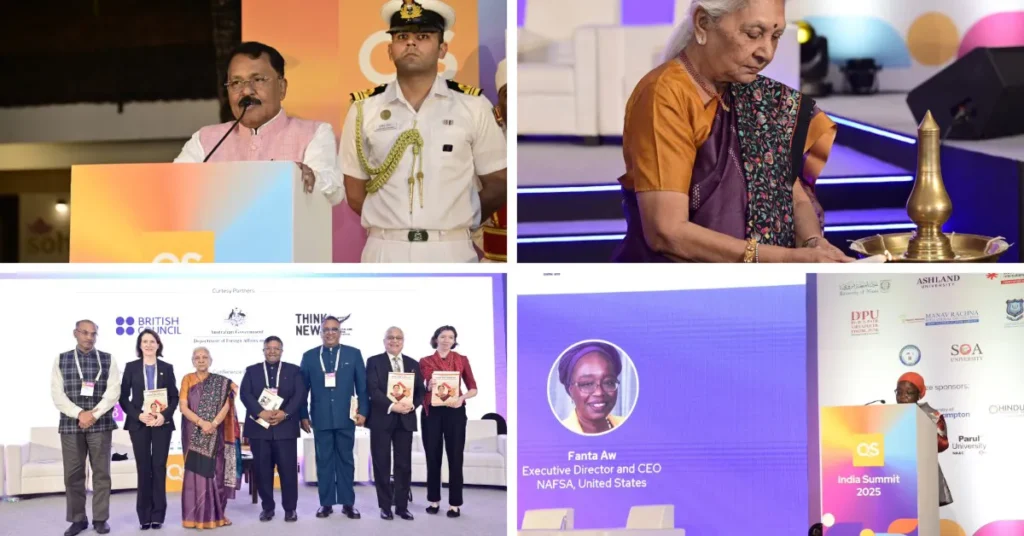Attending the QS India Summit 2025 in Goa was a deeply meaningful experience for me, both professionally and personally. As someone who started my journey as an international student in New Zealand and later transitioned into an entrepreneur and technology leader, this event reinforced my belief in the power of people-to-people connections and industry-academic collaborations in driving innovation between India and New Zealand.
I had the privilege of joining an insightful panel discussion led by Professor Rajesh Dhakal (University of Canterbury) alongside an incredible group of speakers:
- Professor Dr Vasant Matsagar – Indian Institute of Technology (IIT) Delhi
- Utsav Shah – Ducon Consultants Pvt. Ltd.
- Dr. Thamban Meloth – National Centre for Polar and Ocean Research (NCPOR)
The conversation explored how universities and industry can work together to drive meaningful research, innovation, and technology transfer—something we at JIX Reality Lab care deeply about.

Key Takeaways & Reflections
- From Research to Reality: Universities play a crucial role in developing new knowledge, but the real impact comes when research is applied to solve real-world problems. Whether it’s seismic engineering, XR-based training solutions, or AI-driven simulations, bridging the gap between academia and industry is where the magic happens.
- Beyond MoUs – Purpose-Driven Collaboration: One recurring theme was that partnerships must go beyond just signing agreements. Whether it’s IIT Delhi’s ‘lab to land’ approach or New Zealand’s sector-based collaboration models, the key is to align efforts with clear objectives and long-term impact.
- Technology Transfer Beyond Borders: Despite the absence of an NZ-India Free Trade Agreement, collaboration is thriving. We heard great examples of seismic engineering technology pioneered in NZ being used in India’s post-earthquake reconstruction efforts, proving that knowledge exchange transcends trade barriers.
My Perspective: People-to-People Connections Drive Innovation
For me, the most inspiring aspect of the summit was the recognition that strong relationships between individuals—researchers, industry leaders, and students—are often the real catalysts for innovation.
Alongside Utsav Shah, a structural engineer and Director of Ducon Consultants Pvt. Ltd., I shared insights on how direct industry engagement with academia accelerates innovation and fosters global partnerships. We emphasized that while trade agreements and institutional collaborations are important, real change happens through direct interactions, mentorship, and knowledge exchange between individuals.

Special Guests: Shri Dr. Pramod Sawant, Chief Minister of Goa, and Lord Johnson, Member of the House of Lords, UK, contributed their perspectives on cross-border education.
- Keynote Speaker: Dr. Fanta Aw, Executive Director and CEO of NAFSA, emphasized the importance of international education and global partnerships.The QS India Summit 2025 also, brought together distinguished leaders from government, academia, and industry to explore the future of global education and research collaborations. These esteemed speakers played a crucial role in shaping discussions on fostering equitable educational collaborations, strengthening university-industry linkages, and positioning India as a hub for research and innovation in an evolving global landscape.
New Zealand’s Contribution to Global Innovation
New Zealand has long been a global leader in seismic engineering, with innovations like seismic base-isolation technology protecting buildings worldwide. The Christchurch Women’s Hospital and Bhuj Hospital in Gujarat, India, are many continents apart, but they share a foundation—both figuratively and literally—built on New Zealand’s earthquake resilience expertise.
As Professor Dhakal highlighted:
“UC’s research in earthquake engineering, renewable energy, and water resource management is creating impact far beyond New Zealand’s borders.”
A Future of Collaboration Between India & New Zealand
Reflecting on the summit, I see immense potential for India and New Zealand to deepen their collaboration in research, technology, and innovation. From Antarctic research and aerospace technology to AI-driven simulations and immersive training, countless opportunities for bilateral partnerships drive sustainable impact.
At JIX Reality, we remain committed to building bridges between academia and industry, between New Zealand and India, and—most importantly—between people who believe in the power of innovation to solve global challenges.
This summit was a reminder that real progress happens when individuals connect, share knowledge, and work together to build something greater than themselves. And that’s a mission I will always stand by.
#JIXReality #QSsummitGoa #UniversityIndustryCollaboration #GlobalInnovation #TechnologyTransfer #ResearchToReality #NewZealand #India #AI #XR



